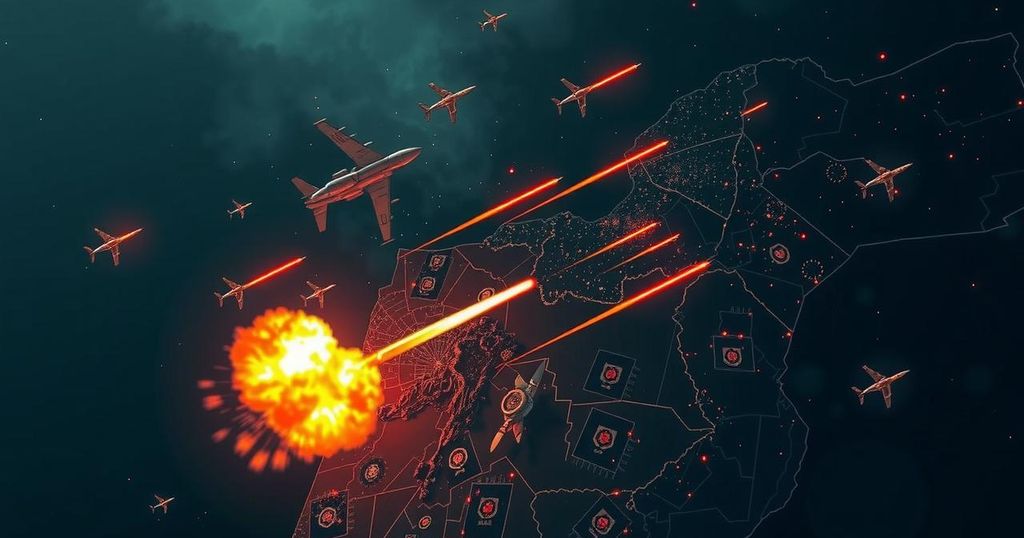A recent rocket attack from Lebanon resulted in the deaths of seven individuals in northern Israel, marking a significant escalation in the conflict involving Israel and Iranian-backed groups. U.S. diplomats are seeking cease-fires in Lebanon and Gaza as Israel continues airstrikes in Syria targeting Hezbollah. The ongoing violence has led to widespread casualties and displacement, raising serious humanitarian concerns.
On Thursday, northern Israel experienced a deadly rocket attack from Lebanon, resulting in the deaths of at least seven individuals, including four foreign laborers. This incident marks one of the most lethal assaults since the onset of Israel’s military campaign earlier in the month. The attacks targeted two distinct locations as U.S. diplomats engaged in discussions aimed at establishing cease-fires in both Lebanon and Gaza, striving to de-escalate the ongoing conflicts involving Israel and Iranian-backed factions in the Middle East during the concluding months of the Biden administration. Since the violent escalation triggered by Hamas’s attack on October 7, 2023, daily rocket, drone, and missile strikes have been launched by the Hezbollah militant organization, met with retaliatory force from Israel. Hezbollah and Hamas, recognized as ideologically allied and Iranian proxies, have been designated as terrorist organizations by numerous countries, including the U.S. In parallel with these developments, the Israel Defense Forces (IDF) conducted airstrikes in Syria targeting sites near Qusair, adjacent to Lebanon, claiming the locations to be stores for weapons intended for smuggling into Lebanon. Reports from Syrian media indicated that these strikes resulted in the deaths of at least five individuals. The situation intensified last month when the IDF executed extensive airstrikes throughout Lebanon, culminating in the death of Hezbollah’s leading figure, Hassan Nasrallah, alongside several of his deputies. Since the initiation of ground operations in Lebanon at the start of October, the Israeli military has reported the deaths of nearly two dozen personnel, while Lebanon’s health authorities have attributed around 2,000 civilian casualties to Israeli airstrikes. The first reports from the Metula regional council indicated fatalities from the rocket strikes, which also significantly impacted the olive harvesting activities in the region. Moreover, Hezbollah’s newly appointed leader, Sheikh Naim Qassem, publicly asserted that the group would persist in combat against Israel unless presented with cease-fire terms that they found acceptable. As airstrikes across Lebanon continued, the Israeli military advised evacuations in multiple regions, signifying an escalation in hostilities. The ongoing conflict has caused substantial devastation in Lebanon, with over 2,800 fatalities and approximately 1.2 million individuals displaced since the conflict’s inception more than a year ago. On the Israeli side, nearly 68 fatalities have been recorded due to rocket attacks from Hezbollah, putting significant pressure on local communities. Diplomatic efforts spearheaded by U.S. officials are aimed at navigating cease-fire negotiations amidst this turmoil. Prime Minister Benjamin Netanyahu’s firm stance emphasizes Israel’s intent to ensure its security against Lebanese threats, expressing skepticism towards the efficacy of proposed international peacekeeping measures.
The conflict between Israel and Iranian-sponsored militant groups, including Hezbollah and Hamas, continues to intensify, particularly following Hamas’s attack on Israel. The dynamics of this confrontation have drawn international attention, especially from the Biden administration, which is seeking to facilitate peace negotiations and alleviate hostilities in the region. This enduring conflict has led to significant casualties on both sides and a humanitarian crisis in Lebanon, where civilian displacement and fatalities continue to escalate. The geopolitical tensions are compounded by the involvement of global powers seeking to mediate and impose cease-fire agreements, amidst mutual distrust and opposing terms from the conflicting parties.
The article illustrates the ongoing and escalating conflict between Israel and Iranian-backed militant organizations in the region, marked by recent deadly rocket attacks that have claimed numerous lives. Diplomatic efforts are underway to broker cease-fires amid persistent violence, revealing deep-seated tensions that complicate peace initiatives. The situation remains critical, with significant implications for regional stability and humanitarian conditions as the international community seeks to navigate the complex dynamics of the conflict.
Original Source: www.cbsnews.com






